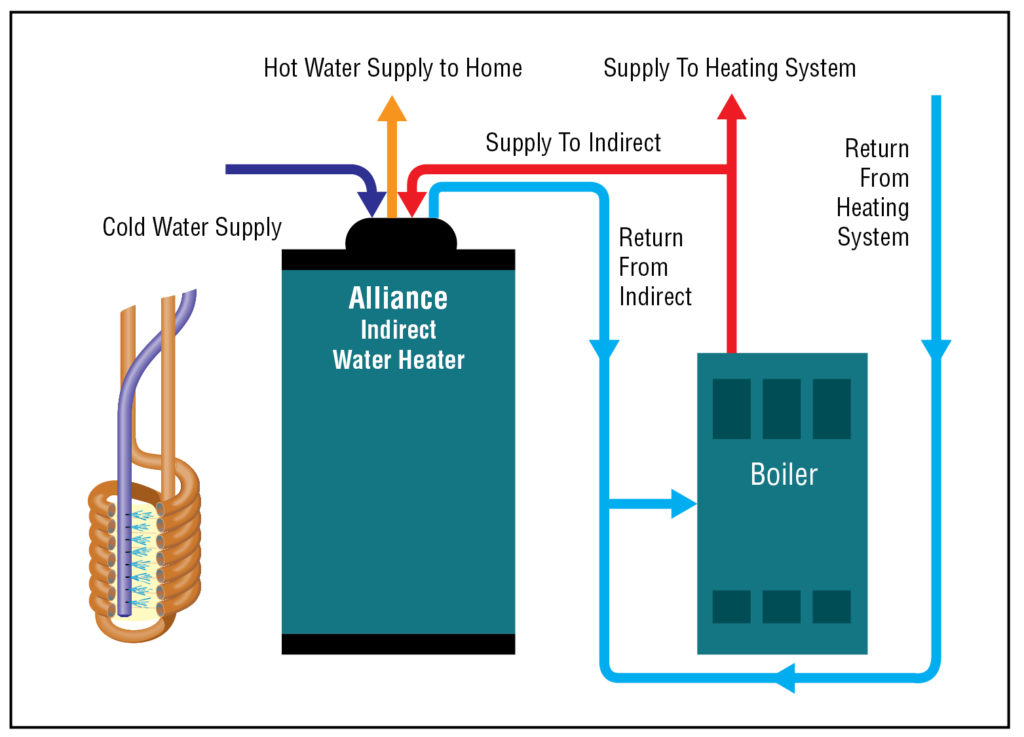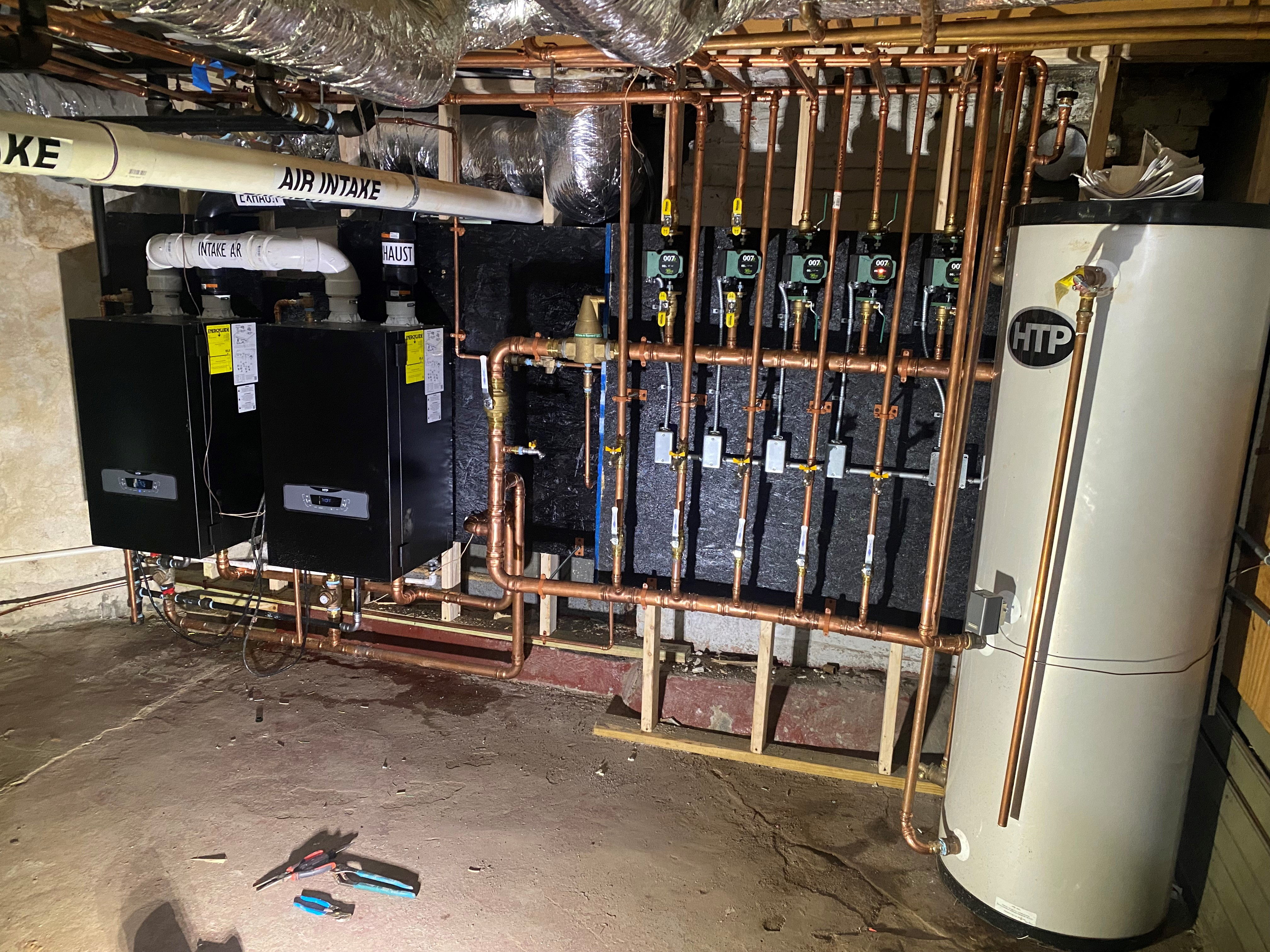Indirect water heaters use a storage tank and heat water indirectly via a boiler, while tankless models heat water on demand. Each system has distinct benefits, catering to different needs.
Choosing the right water heater is crucial for efficiency and comfort in your home. Indirect water heaters are excellent for larger households, providing a steady supply of hot water. They rely on existing heating systems, making them energy-efficient. On the other hand, tankless water heaters offer instant hot water, ideal for smaller spaces and lower energy bills.
Understanding the key differences between these two types can help you make an informed decision. Evaluate your hot water needs, budget, and space to find the perfect solution for your home’s requirements.
Page Contents
- 1 Introduction To Water Heating Options
- 2 Basics Of Indirect Water Heaters
- 3 Exploring Tankless Water Heaters
- 4 Energy Efficiency Compared
- 5 Installation And Maintenance
- 6 Longevity And Durability
- 7 Cost-benefit Analysis
- 8 Environmental Impact
- 9 Choosing The Right System
- 10 Real-world User Experiences
- 11 Final Verdict In The Efficiency Battle
- 12 Frequently Asked Questions
- 13 Conclusion
Introduction To Water Heating Options
Choosing between indirect water heaters and tankless water heaters is important. Each type has unique benefits.
Indirect water heaters use a boiler to heat water. They store hot water in a tank. This setup provides a steady supply of hot water. They can be more energy-efficient than traditional heaters. Installation can be complex and may require extra space.
Tankless water heaters heat water on demand. They do not store hot water, saving space. These heaters are often more energy-efficient. They provide a constant supply of hot water. Initial costs can be higher, but they save money over time.
Basics Of Indirect Water Heaters
Indirect water heaters are efficient systems that use existing heating sources. They rely on a boiler or furnace to heat water. This method helps save energy and reduces costs.
Key components of indirect water heaters include a storage tank, a heat exchanger, and a circulation pump. The storage tank holds hot water ready for use. The heat exchanger transfers heat from the boiler to the water. The circulation pump moves water through the system.
These heaters are great for homes with high hot water demand. They provide a steady supply without running out quickly.
Exploring Tankless Water Heaters
Tankless water heaters heat water on demand. They do not store water like traditional heaters. This means they save energy and space.
These systems use gas or electricity to warm water directly. When you turn on a tap, hot water flows immediately. There is no waiting for a tank to fill.
Some essential features include:
- Energy efficiency: Less energy is wasted, leading to lower bills.
- Endless hot water: Enjoy continuous supply without running out.
- Space-saving design: Compact size fits in small areas.
- Long lifespan: Typically lasts longer than traditional water heaters.
Energy Efficiency Compared
The heating mechanism of indirect water heaters uses a boiler. This system heats water more efficiently than traditional methods. Tankless water heaters heat water on demand. This means no water sits unused and cold. Both systems offer energy savings based on usage.
Standby heat loss occurs in indirect water heaters. They keep water hot, even when not in use. This can waste energy over time. Tankless models eliminate this waste. They heat water only as needed, preventing unnecessary energy loss.
| Type | Heating Mechanism | Standby Heat Loss |
|---|---|---|
| Indirect Water Heater | Boiler heats water | Yes, water stays hot |
| Tankless Water Heater | On-demand heating | No standby loss |
Installation And Maintenance
Initial setup costs for an indirect water heater are typically higher. You need to install a storage tank. This setup requires more plumbing work.
Tankless water heaters have lower initial costs. They need less space and simpler installation. This makes them attractive for many homeowners.
Ongoing maintenance for indirect heaters is usually more frequent. Regular checks on the tank and heating system are essential. This helps prevent issues over time.
Tankless systems require less maintenance. Cleaning the filters and descaling the unit is enough. This can save time and money in the long run.
Longevity And Durability
The lifespan of indirect water heaters is usually 15 to 20 years. Tankless systems can last 20 years or more. Many factors can affect how long these systems last.
Quality of materials plays a big role. Higher quality parts lead to longer life. Maintenance is also important. Regular check-ups can extend a system’s lifespan.
Water quality impacts durability too. Hard water can cause build-up and damage. Installation quality matters as well. Poor installation can lead to early failures.
| System Type | Lifespan |
|---|---|
| Indirect Water Heater | 15-20 years |
| Tankless Water Heater | 20+ years |
Cost-benefit Analysis
Indirect water heaters typically have lower upfront costs. They can be cheaper to install. Tankless systems, however, may save money over time. Their energy efficiency can lead to lower bills.
Short-term costs for indirect heaters are often less. Tankless systems need a higher initial investment. Long-term savings can offset these costs. Energy savings can be significant over many years.
Rebates and incentives can help with costs. Many regions offer financial help for tankless systems. This can make the switch more affordable. Always check local programs for available options.

Credit: www.usboiler.net
Environmental Impact
The carbon footprint of indirect water heaters is often higher than tankless models. This is due to the energy used in heating water and maintaining temperature. Tankless heaters provide hot water on demand, reducing energy waste.
Using a tankless water heater can lower greenhouse gas emissions. This makes it a more sustainable choice for the environment. Many homeowners are switching to these systems for better energy efficiency.
Sustainable practices include regular maintenance. Keeping heaters in good condition helps them run more efficiently. Reducing energy consumption leads to a smaller carbon footprint.
Choosing the right system can contribute to a healthier planet. Conserving energy is essential for future generations.
Choosing The Right System
Choosing the right system starts with assessing household needs. Think about your family’s hot water usage. Consider how many people live in your home. Do you have multiple bathrooms or appliances using hot water at once?
Tankless water heaters offer endless hot water. They heat water on demand, saving energy. Indirect water heaters use a storage tank. They can be more efficient for larger families.
Future-proofing your investment is essential. Look for systems that are easy to upgrade. Choose models with good warranties. This ensures long-term savings and reliability.

Credit: www.icmechanicalservices.com
Real-world User Experiences
Many users share their thoughts on indirect water heaters and tankless systems. Some appreciate the energy efficiency of tankless options. They enjoy hot water on demand without waiting.
Others prefer indirect water heaters for their consistent supply. These systems can store more water, making them suitable for larger families.
| Customer | Experience |
|---|---|
| John D. | Likes tankless for its space-saving design. |
| Emily R. | Prefers indirect for its reliability during peak times. |
| Mike S. | Finds tankless great for instant hot water. |
| Sarah P. | Values indirect for lower energy bills. |
Final Verdict In The Efficiency Battle
Choosing between an indirect water heater and a tankless option depends on your needs. Indirect heaters use existing systems, providing hot water efficiently. They work well for homes with high demand.
Tankless systems heat water on demand. They save space and energy. However, they may struggle with multiple hot water uses at once.
For homeowners, consider your hot water usage and energy efficiency. If your family uses a lot of hot water, an indirect heater may be best. If saving space is key, a tankless option is ideal. Evaluate your budget and installation costs before deciding.

Credit: www.phcppros.com
Frequently Asked Questions
Which Is Better, A Tankless Or Indirect Water Heater?
Tankless water heaters provide hot water on demand and save space. Indirect water heaters use a storage tank, offering a steady supply. Choose a tankless model for efficiency and convenience. Opt for an indirect heater if you prefer a consistent hot water supply for multiple uses.
What Are The Disadvantages Of An Indirect Hot Water Supply System?
Indirect hot water supply systems can lead to slower heating times. They often require more space for components. Maintenance can be complex and costly. Energy efficiency may be lower compared to direct systems. Lastly, potential heat loss can occur in the distribution pipes.
How Efficient Are Indirect Water Heaters?
Indirect water heaters are highly efficient, using a boiler or furnace to heat water. They typically offer quick recovery rates and can provide a steady supply of hot water. Their efficiency can lead to lower energy bills compared to traditional systems, making them a cost-effective choice for many households.
What Is The Life Expectancy Of An Indirect Hot Water Heater?
The life expectancy of an indirect hot water heater typically ranges from 10 to 20 years. Factors such as maintenance, water quality, and usage can influence its longevity. Regular inspections and proper care can help extend its lifespan and improve efficiency.
Conclusion
Choosing between an indirect water heater and a tankless option depends on your needs. Consider efficiency, installation space, and budget. Each type offers unique benefits. Take your time to evaluate what works best for your home. Making the right choice will enhance comfort and save on energy costs in the long run.
